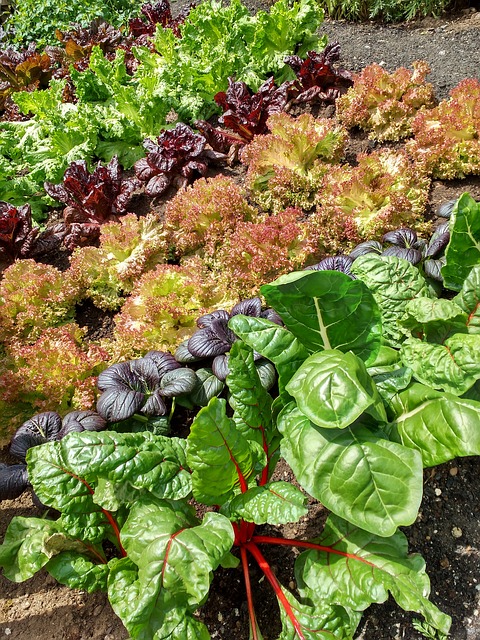
Organic Gardening Natural No Dig Way
These days of busy lifestyles, career expectations, heavy work loads and family time have made us look at easier, less time-consuming methods of growing veg.
Raised beds and an organic gardening natural no dig way are probably the most popular methods to grow your own.
My grandpa used to grow his own vegetables. He was of the generation who was exhorted by the British government to “dig for Britain” to help the war effort. Growing your own vegetables improved your healthy food availability at a time when rationing made preparing nourishing meals difficult.
Everyone has a bit of space to grow some vegetables or fruit whether in a small garden or large plot, even on a balcony or a backyard patio.
Fruit and vegetables can be grown in containers, window boxes and hanging baskets.Best Plants for Hanging Baskets
A small raised bed will yield a good amount of healthy, low cost, fresh food. They can be made by recycling old wood, pallets, or bricks. Raised beds kits are also widely available.
Raised planting beds vegetable gardening reduces maintenance time and increases access as you can move all around them, they are usually separated by pathways.
You can also build them as high or as low as required, which helps to avoid too much back-breaking bending. The pathways between can be any width to allow wheelchair gardeners to have access to beds easily too.
Organic Gardening Natural No Dig Way
With all the climate change and environmental issues to the fore many of us endorse the organic gardening, natural, no dig way.
Back in the 1980’s Charles Dowding started the eco-friendly, no dig method for growing organic vegetables.Further reading on the No Dig Way
When soil is turned over by digging, weeds are encouraged to grow as the roots and seeds are revitalised, resulting in a mass of growth of plants we don’t want or need in the vegetable patch. Having to dig, hoe and remove these weeds is a time-consuming chore. The no dig way means fewer weeds and more time to grow, plus with less work to do, gardening becomes even more enjoyable.
No dig soil is full of nutrients and moisture which plants will find and use, therefore your veg is healthier.
This also means you have less feeding or watering to do.Easy Low Maintenance Garden Ideas
Grow Your Own
Grow your own has for many people here in the UK become a mantra. Allotments around the country have more folk than ever asking for a plot, or going on a waiting list for one.
In a time as well that sadly, councils are reclaiming allotment land for building on, we need to support and use allotments as much as we possibly can, in the hopes that communities will manage to retain them. Many communities have gone to court to fight against losing their allotments.
Novice gardeners starting out with their first garden will learn new, beneficial skills whilst discovering the joys of gardening by turning their hand to growing vegetables and have fun into the bargain.
Kids love to help in the garden or allotment. It’s so much fun for them to run around outdoors or dig in the soil with their tiny garden tools planting vegetable seeds, “magic beans”. They love it!Fun Gardening Ideas for Kids
They learn where their food comes from and how it is produced which makes them more inclined to eat it. 5 a day is the norm for a healthy diet full of vitamins and freshness.

How to Start your No Dig Vegetable Bed
The garden plot that has woody or deep-rooted perennial weeds must be cleared of them first.
Annual weeds are not such a problem as the no dig method involves covering the ground with organic mulch which stops light getting to the weeds and slows regrowth.Electric Weed Burner
Organic, well composted mulch feeds the soil, adds nutrients and helps retain moisture, thereby giving your vegetables a good healthy start. Even poor clay soil and other poor soil types will produce healthy veg if organic materials, composts, manure etc is included to revitalise the soil and when implementing the no dig method.
With a good depth of compost, 6in, and few perennial weeds, no dig beds can be planted straight away and you will have crops in the first year.
If you are dealing with lots of perennial weeds then it can take 6 to 12 months of light deprivation to kill them off before you can plant.
Once you have put the organic mulch over the soil, cover with black plastic, old carpet, thick cardboard or anything to keep the light out. Underneath these materials, the organic matter, worms, etc will be working away, improving the soil.
A few perennial weeds will still come through but these can be dealt with as and when you see them. Weakened roots can be dug out before you start sowing veg seeds.
Building wooden raised beds around the plot helps to keep it all looking tidy, and aids weed restriction.
7 Easy assemble gardening raised beds kits.
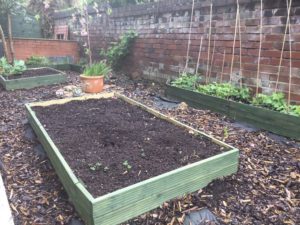
Pathways between the beds need mulching too to reduce weeds.
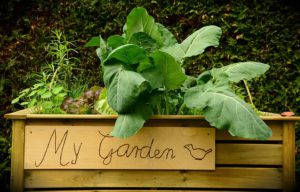
Some weeding will still have to be done as and when necessary but nowhere near as much as without using mulch on paths.
After sufficient time for the mulch to kill the weeds, (annuals can take 3 to 4 months, perennials 6 to 12 months) if you peel back a corner and there is no new growth of weeds then you can start to use the bed. Remove the top weed restriction membranes, underneath you will find a deep, rich compost in which to sow your vegetable seeds.
Hoe lightly to break down any still large soil clumps. Seeds germinate best in a crumbly, fine layer of compost. Healthy, strong plants will easily send their roots down deep into the soil below.
The best time to spread a top layer of organic compost is in the autumn. This allows for frost to break it down and worms too have plenty of time to work through it leaving you with a wonderfully rich growing medium to plant in spring.
After your first harvest, mulch the bed again with a few inches of well composted, organic material and you’re ready to plant again. The no dig way results in higher, healthier crop yield. More often than not you will get two harvests a year all with less maintenance.

Which vegetables and fruit to grow?
Anything you fancy really. Grow the food you enjoy eating and experiment to experience new vegetables and flavours. Learning to cook your homegrown vegetables is all part of the fun.
There is nothing as good as homemade preserves such as jams, pickles, chutneys, fruit butters or sauces which can be made when you have a glut of produce. These can be sold to help pay for the next lot of seeds, therefore your plot or raised bed pays for itself financially too, in addition to all the physical and mental benefits of gardening. Alternatively excess produce or your homemade preserves can go into a community swap scheme. It’s a win-win situation for everyone involved.
If you’re like me, you will be munching fruit and vegetables as you pick it.
Click here for special offers on fruit trees
Whether in no dig beds, raised beds, containers, potato sacks or amongst your flower beds, the choice of what to grow is entirely yours.

- Strawberries
- Fruit Trees
- Blueberries
- Rhubarb
- Raspberries
- Loganberry
- Blackberry
- Tomatoes
- Potatoes
- Brassicas
- Onions and Garlic
- Salad crops
- Radish
- Radicchio
- Squash and Pumpkins
- Beans
- Peas
- Artichokes
- Spinach
- Herbs
The above list is only the start of what you could grow.

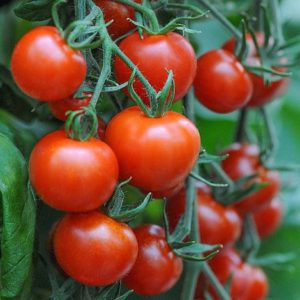
Click here for vegetable seeds.
Edible Britain
Edible Britain is this years’ theme for National Gardening Week.What is National Gardening Week About?
The gardening week aims to encourage more people to grow, eat and enjoy more homegrown fresh vegetables and fruit.
Lots of events around the UK are celebrating Edible Britain.
Get involved, let me know what is happening in Your town.
So lots to think about and do, start growing your own vegetables and fruit, even if it is just a hanging basket full of strawberries or cherry tomatoes, you will benefit from doing so.
The taste, freshness, nutritional value and abundance cannot be highlighted enough, there really is nothing better than homegrown veg.
Let me know in the comments box below which vegetables you are growing right now. I love to hear from you and I always reply to your messages.
If you have found this article useful please share with friends and family and social media.
Happy Gardening.

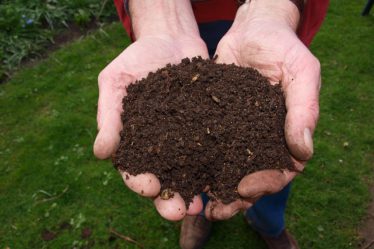

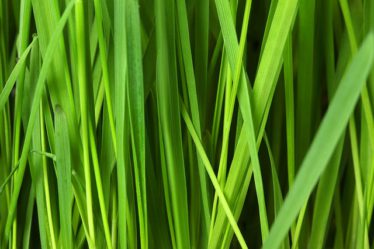

Great article
We love growing veg , our grandsons really love to come and help too.
Lots of good ideas here I’m going to try a raised bed for the no dig method, sound like the best way forward
Hello,
Good to know you enjoy gardening with your grandsons, it benefits you all, carry on gardening and growing your own vegetables and fruit.
Louise
Thanks Louise, no wonder I have so much weed in my garden. I try year in year out to get rid of them but they keep coming back. Now I know about no dig gardening and how to plant so sun does not get to the weeds. I’ll practise that method this year and hopefully the weeds in my garden will die off.
Hello Juliet,
Thank you for your comments, The no dig way is a great method for reducing weeds.
Enjoy your gardening and good luck with the weeds!
Louise
I am interested in the no dig method to grow some edible plants. I had a bed like this recently. I grew tomatoes and peppers. I love green beans but did not try growing those. Now I live in a different home and only have a patio. It is a small yard that is paved and I only have soil around the edges. I am thinking about growing tomatoes in a hanging basket or a pot. I have had success with that method in the past. Have you had success with hanging pots or containers on the fence?
Hello Cynthia,
Thank you for your time to send me a comment.
Strawberries and cherry tomatoes are great to grow in hanging baskets, I have some just in real of my kitchen window! Herbs too.
Yes containers that hanging on fences or indeed vertical planters are idea for growing, salad crops, herbs, tomatoes and strawberries.
Best Wishes
Louise